Overview
Understanding the onset of type 2 diabetes is essential for anyone navigating this journey. This chronic condition can feel overwhelming, but you are not alone. It's important to recognize the causes, symptoms, and risk factors associated with type 2 diabetes. By understanding these elements, you can take proactive steps toward better health.
Effective lifestyle changes play a crucial role in managing and preventing type 2 diabetes. Simple adjustments, such as improving your diet and increasing physical activity, can significantly enhance blood sugar control and overall health outcomes. It's understandable to feel unsure about where to start, but remember, education and community support are vital resources that can guide you.
You might find comfort in knowing that many have successfully managed their diabetes through these changes. Sharing experiences and learning from others can foster a sense of connection and support. We encourage you to reach out and connect with your community; you're not alone in this journey.
In conclusion, taking action today can lead to a healthier tomorrow. Embrace the support available to you, and remember that every small step counts. We are here to support you every step of the way.
Introduction
In the face of a growing diabetes epidemic, understanding Type 2 Diabetes has never been more critical. This complex condition affects millions, altering how the body processes glucose and posing serious health risks if left unmanaged. It's understandable to feel overwhelmed when faced with such statistics, especially knowing that 1 in 10 adults in the United States is affected. The urgency for education and intervention is palpable, and it's important to know that you are not alone in this journey.
As individuals grapple with this diagnosis, lifestyle changes, innovative community support, and new treatment options offer hope. You might wonder what steps to take next. This article delves into the multifaceted nature of Type 2 Diabetes, exploring its symptoms, risk factors, and the vital role of mental health in managing this chronic disease. By equipping readers with knowledge and resources, it aims to empower those affected to take proactive steps toward better health and well-being. We are here to support you every step of the way.
What is Type 2 Diabetes? An Overview
Diabetes mellitus type 2 is a chronic condition that significantly alters how the body metabolizes sugar (glucose), a crucial energy source. This condition is characterized by the onset of type 2 diabetes, which can occur when the body either becomes resistant to insulin—a hormone essential for facilitating the entry of sugar into cells—or fails to produce sufficient insulin to maintain normal glucose levels. This dysfunction leads to elevated blood sugar levels, which, if not properly managed, can result in serious health complications.
Unlike type 1 diabetes, which is usually identified during childhood, type 2 diabetes is primarily observed in adults. However, it’s concerning to see a rising incidence of type 2 diabetes among children and adolescents, largely attributed to increasing obesity rates. Recent statistics indicate that around 1 in 10 adults in the United States is living with this condition, and the growing occurrence among children highlights the urgent need for effective education and intervention strategies.
In fact, the NHS estimates that effective control of the disease could save approximately £175,000, underscoring the economic impact of addressing this condition.
Understanding the onset of type 2 diabetes is crucial for effectively managing and preventing complications. Experts emphasize the importance of lifestyle modifications, such as dietary changes and increased physical activity, as foundational strategies for managing this condition. As natural wellness proponent Mike Adams points out, "Pharmaceutical firms are eager to transform the population with diabetes into another profit-producing income stream."
The truth is that the onset of type 2 diabetes can be addressed in a matter of weeks through relatively simple changes in diet and lifestyle. Recent studies have shown that these interventions can lead to significant improvements in blood sugar control and overall health.
Moreover, innovative education programs for managing blood sugar levels are emerging, focusing on empowering individuals with knowledge about their condition. T2DSolutions strives to be a complete resource center for Type 2 and Type 3 blood sugar management education and community support. They offer practical advice and foster a sense of belonging among participants. Community-based initiatives have proven effective in enhancing blood sugar control through peer support and shared experiences, which are crucial for long-term commitment to treatment strategies.
A significant illustration of this is Merck's corporate approach, which has concentrated on diabetes medication development, particularly with products like Januvia, highlighting the importance of innovation in diabetes treatment.
Current research continues to investigate the complexities of insulin resistance and its role in the onset of type 2 diabetes. Understanding the mechanisms behind insulin resistance is essential for developing targeted therapies and improving patient outcomes. As the field evolves, staying informed about new findings and treatment options is critical for those affected by this condition.
In summary, the onset of type 2 diabetes is a multifaceted condition that requires a comprehensive strategy for care. By grasping its effect on glucose metabolism and utilizing available resources such as T2D Solutions, individuals can take proactive measures toward improved well-being. Furthermore, wellness initiatives, like those acknowledged by Atmantan Wellness Resort, emphasize the increasing awareness of holistic strategies for diabetes care, further elevating the significance of this conversation. You're not alone in this journey, and we are here to support you every step of the way.
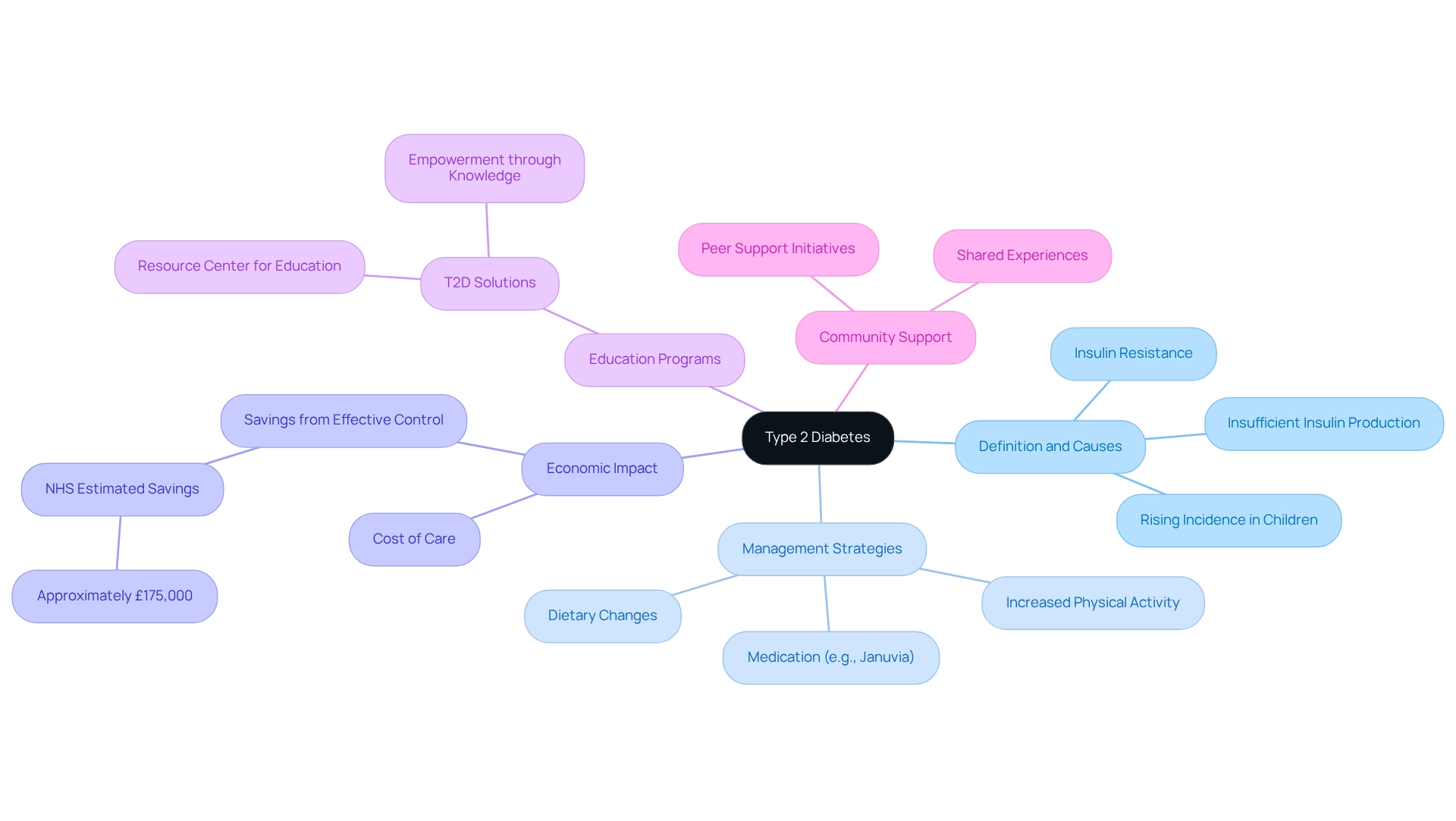
Recognizing the Symptoms of Type 2 Diabetes
Common symptoms of Type 2 Diabetes can significantly impact daily life and health, especially with its onset. Identifying these symptoms early is essential for effective management and prevention of complications. Here are some key symptoms to be aware of:
- Increased thirst and frequent urination: Elevated blood sugar levels lead to excess sugar in the bloodstream, pulling fluid from tissues and causing increased thirst and more frequent urination.
- Extreme hunger: Insufficient insulin prevents sugar from entering cells, leading to a lack of energy in muscles and organs, which triggers intense hunger.
- Fatigue: When cells are deprived of sugar, individuals often experience fatigue and irritability, making daily activities challenging.
- Blurred vision: High blood sugar can draw fluid from the eye's lenses, impairing the ability to focus clearly.
- Slow-healing sores or frequent infections: Diabetes can hinder the body's natural healing processes, leading to prolonged recovery times.
- Areas of darkened skin: Some individuals may notice dark patches, particularly in skin folds, which can indicate insulin resistance.
Statistics reveal that Type 2 Diabetes was the eighth leading cause of death in the United States in 2021, with over 103,000 death certificates identifying it as the underlying cause. This underscores the critical need for early recognition and management of symptoms to mitigate its impact on public health. The considerable mortality linked to Type 2 Diabetes highlights the urgency of identifying symptoms promptly and seeking medical assistance.
Current research emphasizes the importance of regular monitoring of glucose levels, Hb A1C, and lipid profiles for effective diabetes management. For instance, keeping LDL cholesterol levels under 100 mg/dL is advised for individuals without atherosclerotic cardiovascular disease, emphasizing a vital aspect of overall health care.
Real-life examples illustrate the significance of recognizing these symptoms. Patients who identified their symptoms early were able to seek medical advice quickly, leading to improved treatment outcomes. As Mayank Singhal stated, "Self-monitoring of blood glucose is a crucial method for patients to take charge of their condition."
By understanding and recognizing these early signs, you can initiate timely interventions, ultimately improving your quality of life. Remember, you're not alone in this journey. As T2DSolutions prepares to launch, it will serve as a valuable resource for newly diagnosed patients, offering education and support to help you understand and manage these symptoms effectively.
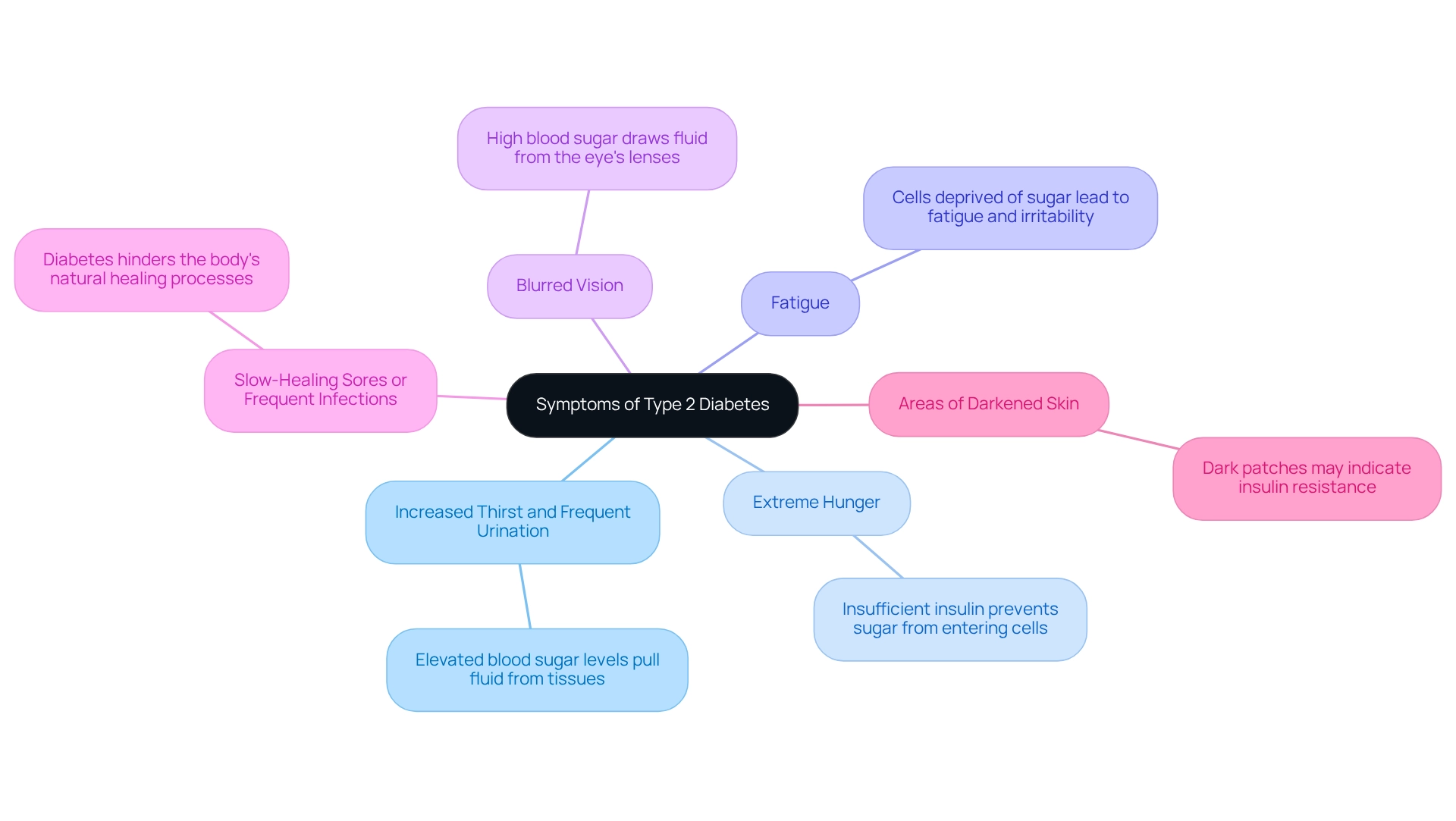
Identifying Risk Factors for Type 2 Diabetes
Several factors can elevate your risk of developing type 2 insulin resistance. Understanding these can empower you to take proactive steps toward your health.
-
Being overweight or obese: Excess body fat, especially around the abdomen, significantly increases your risk. It's understandable to feel overwhelmed by this, but recognizing it is the first step.
-
Inactivity: A sedentary lifestyle can contribute to weight gain and heighten the risk of type 2 diabetes by developing insulin resistance. Remember, small changes can lead to big improvements.
-
Family history: If insulin resistance runs in your family, this indicates a genetic predisposition to type 2 diabetes. You're not alone in this journey; many face similar challenges.
-
Age: The risk of insulin resistance increases as you age, particularly after age 45. It’s important to stay informed and proactive as you navigate these changes.
-
Ethnicity: Certain ethnic groups, including African Americans, Hispanic Americans, Native Americans, and some Asian Americans, have a higher risk for type 2 diabetes. This is a community issue, and sharing experiences can foster support.
-
High blood pressure and abnormal cholesterol levels: These conditions can increase your risk due to their contribution to insulin resistance. It’s crucial to monitor these as part of your overall health.
-
Gestational insulin resistance: Women who experienced this during pregnancy are at a higher risk for developing type 2 diabetes later in life. If this resonates with you, know that there are resources available to help.
Understanding these risk factors can help you feel more in control and ready to seek support. Remember, you are not alone in this journey, and we are here to support you every step of the way.
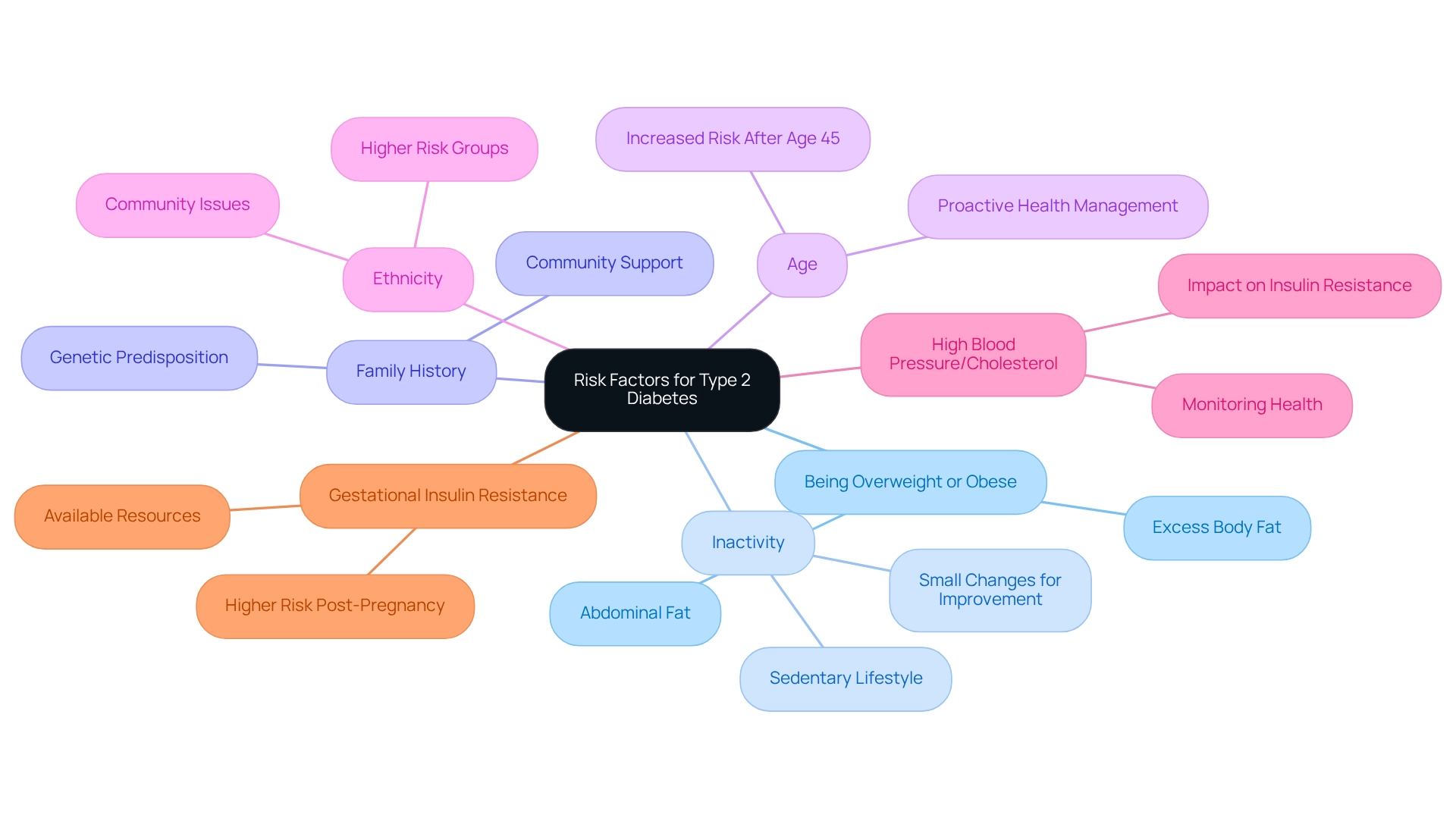
Clinical Implications of Early-Onset Type 2 Diabetes
Early-onset Type 2 Diabetes presents unique clinical challenges that necessitate thoughtful consideration and proactive management.
-
Increased Risk of Complications: Younger patients diagnosed with Type 2 Diabetes often face a heightened risk of complications such as cardiovascular disease, neuropathy, and retinopathy at an earlier age than those diagnosed later in life. It's understandable to feel alarmed by statistics indicating that individuals with early-onset blood sugar issues may develop complications related to Type 2 Diabetes up to a decade sooner. This underscores the urgency for effective management strategies.
-
Need for Aggressive Management: Early intervention is crucial to prevent disease progression and mitigate associated complications. This approach typically involves lifestyle modifications, such as adopting a balanced diet and engaging in regular physical activity, alongside potential medication and consistent monitoring of blood glucose levels. For instance, consider the inspiring story of a couple who effectively lost 118 pounds together without medication, showcasing the profound impact of lifestyle changes on health and emphasizing the potential for significant improvements through dedication to healthy habits.
-
Psychological Impact: The emotional and psychological toll of a diabetes diagnosis can be significant for young individuals. Many experience anxiety and depression related to their condition, which can complicate management efforts. Recent studies highlight the necessity for resilience-enhancing approaches to address the connection between distress related to blood sugar management and mental well-being issues. As Freitag wisely pointed out, "If you feel your mental well-being has taken a hit, don’t be afraid to seek professional assistance." This emphasizes the importance of proactively addressing mental wellness.
-
Importance of Education: Comprehensive education on blood sugar management is vital for young patients and their families. Understanding the condition empowers them to develop effective self-management skills, essential for long-term health. Educational resources provided by T2D Solutions will cover not only the medical aspects of diabetes but also the psychological and social dimensions, fostering a holistic approach to care.
Healthcare providers must integrate these considerations into treatment plans for younger patients to prevent the onset of Type 2 Diabetes. By addressing the distinct challenges they encounter, such as the potential for early complications and the psychological effects of their diagnosis, providers can enhance the quality of care and improve patient outcomes. Community support, as emphasized by T2D Solutions, plays a crucial role in fostering resilience and hope.
The platform encourages individuals to share their experiences and connect with others facing similar challenges. This sharing can lead to improved health outcomes through collective knowledge and support. You're not alone in this journey; we are here to support you every step of the way.
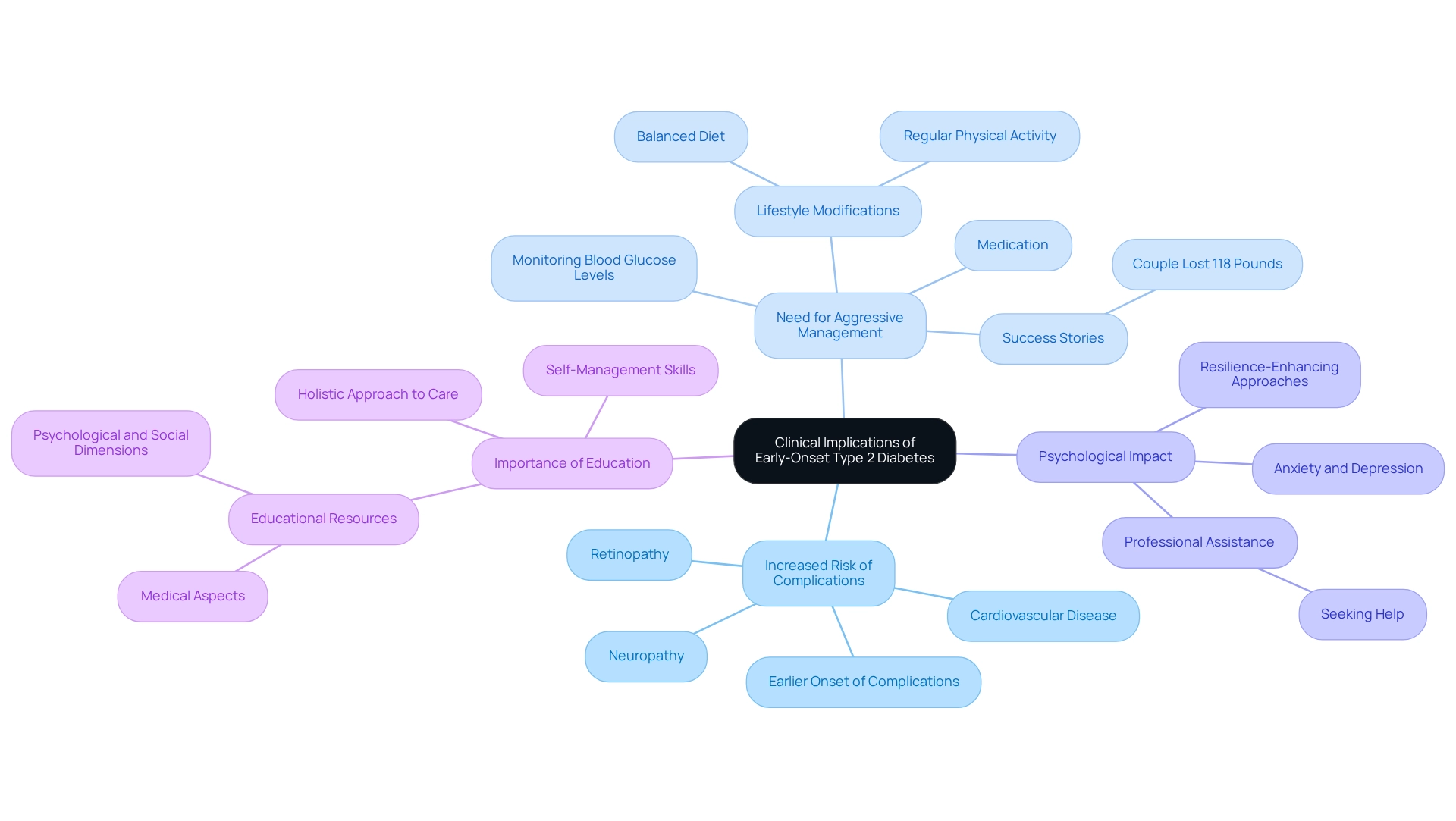
The Pathophysiology of Type 2 Diabetes: How It Develops
A complex interaction of insulin resistance and impaired insulin secretion can lead to the onset of type 2 diabetes. Initially, your body tries to compensate for insulin resistance by increasing insulin production. However, as the demand on your pancreas grows, it may struggle to keep up, which can ultimately result in elevated blood glucose levels and the onset of type 2 diabetes.
Type 2 diabetes is significant, representing up to 90% of diabetes cases. This highlights its importance in diabetes management. The primary factors contributing to the pathophysiology of Type 2 Diabetes include:
- Insulin Resistance: In this condition, muscle, fat, and liver cells may not respond well to insulin, making it difficult for your body to take up and use glucose. This resistance is often linked to obesity, where excess fat can contribute to type 2 diabetes and metabolic issues. Over time, the pancreatic beta cells, responsible for producing insulin, may not function adequately, leading to insufficient insulin secretion and worsening hyperglycemia. Research indicates that the median HbA1c for groups with Type 2 Diabetes is 55 mmol/mol, suggesting challenges in managing blood sugar levels.
- Increased Glucose Production: The liver may also produce excess glucose, further raising blood sugar levels. This process can become dysregulated in those with Type 2 Diabetes.
Chronic inflammation plays a crucial role in the onset of type 2 diabetes, especially in individuals with obesity due to ongoing low-level inflammation. Studies show that elevated inflammatory markers are linked to insulin resistance and the progression of type 2 diabetes. For instance, a study titled "Diabetic Neuropathy and Inflammatory Biomarkers" analyzed serum from 100 participants with Type 2 Diabetes and found increased levels of inflammatory markers compared to healthy individuals, underscoring the connection between systemic inflammation and diabetes progression.
Understanding these mechanisms is vital for creating effective strategies to prevent type 2 diabetes. Recent advancements in treatment, such as GIP receptor agonists, show promise in enhancing insulin sensitivity and overall metabolic health. These dual agonists target both GIP and GLP-1 receptors, offering potential benefits for blood sugar control and weight management.
This important work was funded by the Russian Science Foundation, Grant # 22-25-00149, which supports ongoing research into these promising treatments.
As T2DSolutions launches as a new resource hub for diabetes education and community support, we encourage newly diagnosed patients to subscribe for updates. Ongoing research into insulin resistance and beta-cell dysfunction continues to shed light on the complexities surrounding type 2 diabetes. It’s important to adopt a holistic approach that includes lifestyle changes, dietary adjustments, and community support. Remember, you're not alone in this journey. By fostering a collaborative environment, we can share knowledge and experiences, ultimately leading to improved health outcomes.
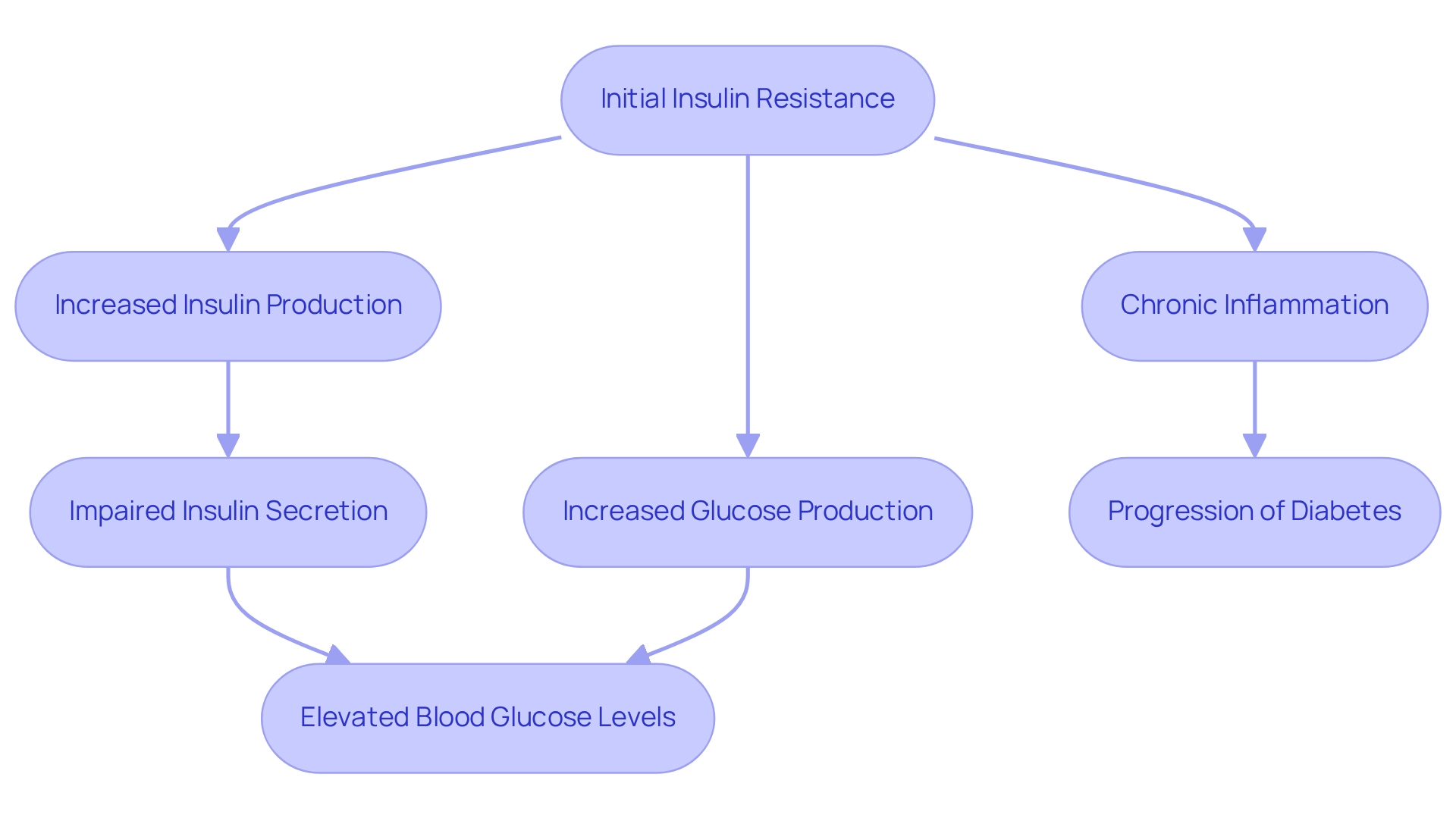
Lifestyle Changes: Diet and Exercise for Diabetes Management
Effective oversight of the onset of type 2 diabetes requires significant lifestyle changes, particularly in diet and exercise. It's essential to approach these changes with compassion and understanding. Here are some key recommendations to consider, supported by T2DSolutions as your resource hub for diabetes education and community support:
- Balanced Diet: Emphasizing whole foods is crucial. Incorporate a variety of fruits, vegetables, whole grains, lean proteins, and healthy fats into your meals. Reducing processed foods, added sugars, and refined carbohydrates can help maintain stable blood sugar levels. Nutritionists often recommend meals rich in fiber and low on the glycemic index to support this goal. T2DSolutions will provide resources and recipes to help you make these dietary changes.
- Portion Control: Being mindful of portion sizes can assist in regulating calorie consumption and promote weight stability, which is essential for blood sugar regulation. T2DSolutions offers tools and guides to help you understand portion sizes better.
- Regular Physical Activity: Aim for at least 150 minutes of moderate-intensity exercise each week, such as brisk walking, cycling, or swimming. Regular physical activity enhances insulin sensitivity and helps lower blood sugar levels, thereby reducing the risk of type 2 diabetes. T2DSolutions will feature exercise programs tailored for individuals with Type 2 Diabetes.
- Monitoring Blood Sugar: Regularly checking blood glucose levels is vital for understanding how different foods and activities impact your body. This practice empowers you to make informed dietary and lifestyle choices. T2DSolutions will provide guidance on effective monitoring techniques.
- Staying Hydrated: Drinking plenty of water while limiting sugary beverages can significantly aid in managing blood sugar levels.
Adopting these lifestyle changes can lead to better blood sugar management and help prevent the onset of type 2 diabetes, enhancing your overall well-being. Recent research has indicated that dietary changes, such as boosting fiber consumption and lowering saturated fats, can significantly improve outcomes for those at risk of type 2 diabetes. For instance, a case study highlighted how a structured dietary intervention led to a notable decrease in HbA1c levels among participants.
Furthermore, exercise initiatives designed for individuals with Type 2 Diabetes have shown tangible success in enhancing wellness metrics. Programs that incorporate both aerobic and resistance training have been particularly effective, with participants reporting better energy levels and improved mood alongside better glycemic control.
As Becky Crowe states, "Safer Roads, Safer Communities: How Road Diets Can Improve Your Neighborhood's Roadways," the importance of community and collaboration cannot be overstated in diabetes management. By sharing experiences and knowledge, we can foster a supportive environment that enhances our journey toward better health. T2DSolutions aims to create such a community.
Expert recommendations consistently underscore the importance of a diabetes-friendly diet, which includes a variety of nutrient-dense foods. By adopting these dietary and exercise strategies, you can take proactive steps toward managing your condition effectively, with T2D Solutions as a guiding resource. Remember, you're not alone in this journey; we are here to support you every step of the way.
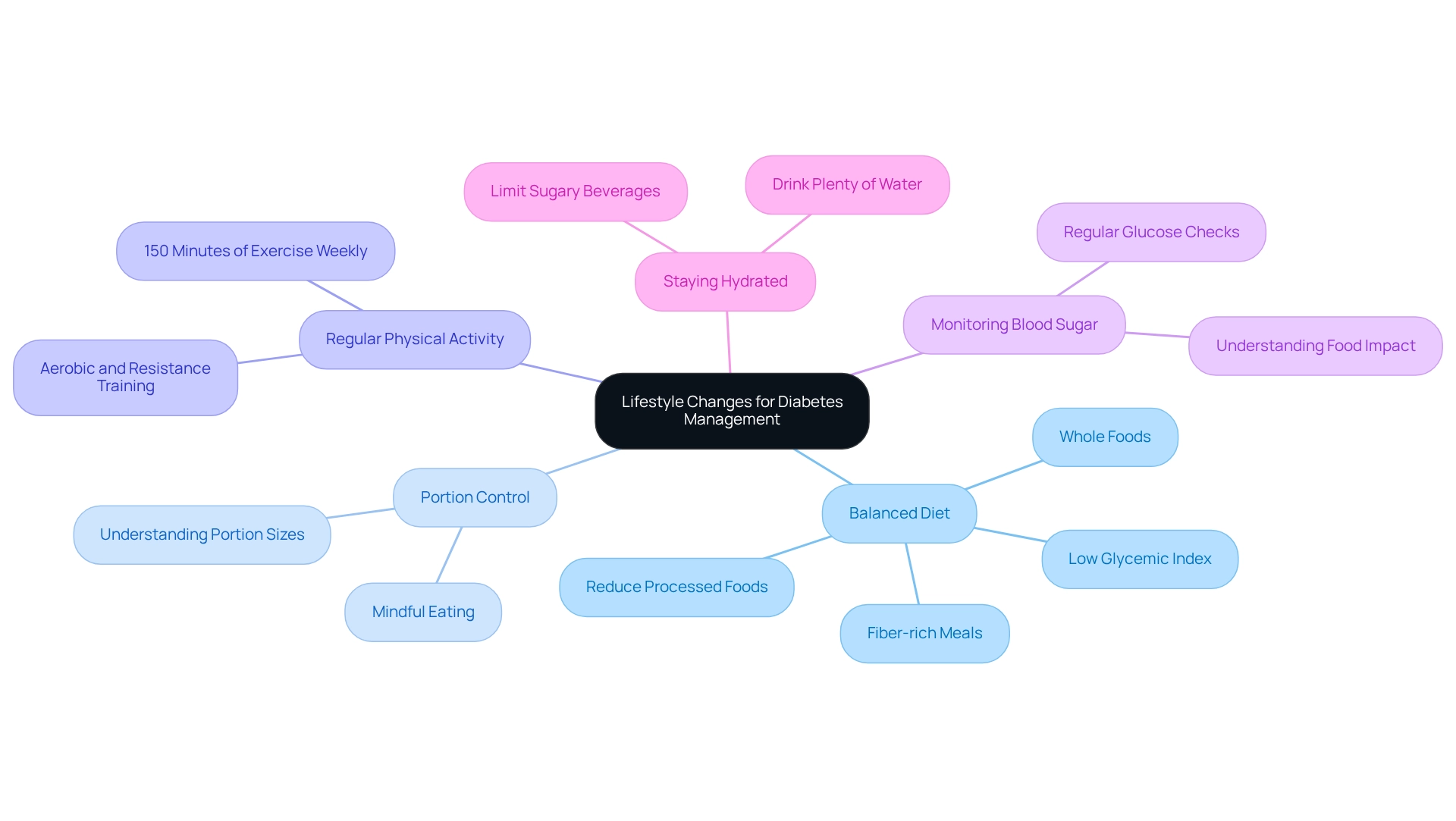
Treatment Options for Type 2 Diabetes: Medications and Beyond
Effectively managing the onset of type 2 diabetes often requires a multifaceted approach that combines lifestyle changes with pharmacological treatments. At T2DSolutions, we understand your journey and are here to support you with a comprehensive resource hub focused on health education and community assistance. Let’s explore the primary treatment options available to you:
-
Metformin: Often the first-line treatment for Type 2 Diabetes, this medication enhances insulin sensitivity and reduces hepatic glucose production, helping to lower blood sugar levels. Recent studies reaffirm that metformin is a cornerstone in managing blood sugar, preventing the onset of type 2 diabetes due to its proven effectiveness and safety profile.
-
Sulfonylureas: These oral medications stimulate the pancreas to secrete more insulin, assisting in lowering blood glucose levels. While effective, they may lead to weight gain and hypoglycemia, so careful monitoring is essential.
-
GLP-1 Receptor Agonists: Administered via injection, these medications not only lower blood sugar but also promote weight loss by enhancing feelings of fullness. They are becoming increasingly popular for their dual benefits, especially for those dealing with obesity.
-
SGLT2 Inhibitors: These medications help excrete excess glucose through urine, lowering blood sugar levels. They also provide cardiovascular benefits, making them a valuable option for those with heart conditions.
-
Insulin Therapy: In certain cases, particularly when other medications are insufficient, insulin therapy may be necessary. This approach allows for precise control of blood glucose levels, especially in advanced stages of the disease.
-
Regular Monitoring: Continuous blood glucose monitoring is vital for assessing treatment effectiveness and making timely adjustments. This practice not only helps maintain ideal blood sugar levels but also reduces the risk of complications associated with the condition.
Working closely with your healthcare providers is crucial to developing a personalized treatment plan that addresses your unique needs and preferences, especially in preventing the onset of type 2 diabetes. For instance, a recent initiative showed that implementing panel support tools improved recommended care for cardiovascular disease from 67.9% to 72.6%, highlighting the positive impact of structured support in managing chronic conditions. This emphasizes the importance of collaboration in achieving better health outcomes.
As we navigate the evolving landscape of blood sugar management, ongoing research continues to reveal new medications and strategies to prevent the onset of type 2 diabetes. Deborah J. Wake, MBChB, PhD, from the School of Medicine at the University of Dundee, emphasizes the importance of community support in managing blood sugar conditions, stating, "We would like to recognize the backing of the Scottish Government in financing this work, appreciate the support of individuals with such conditions throughout Scotland for aiding in the creation and assessment of the MDMW project."
Moreover, the anticipated introduction of mobile wellness applications aims to enhance patient engagement and self-management capabilities, empowering individuals to take charge of their well-being. These applications are expected to provide features like online health record access and participation in online forums, aligning with user preferences for modern healthcare tools. By staying informed about the latest developments and actively participating in your treatment, you can significantly improve your health outcomes.
To keep abreast of the latest resources and support available through T2DSolutions, we invite you to subscribe for email updates. Together, we can face the challenges of blood sugar control.
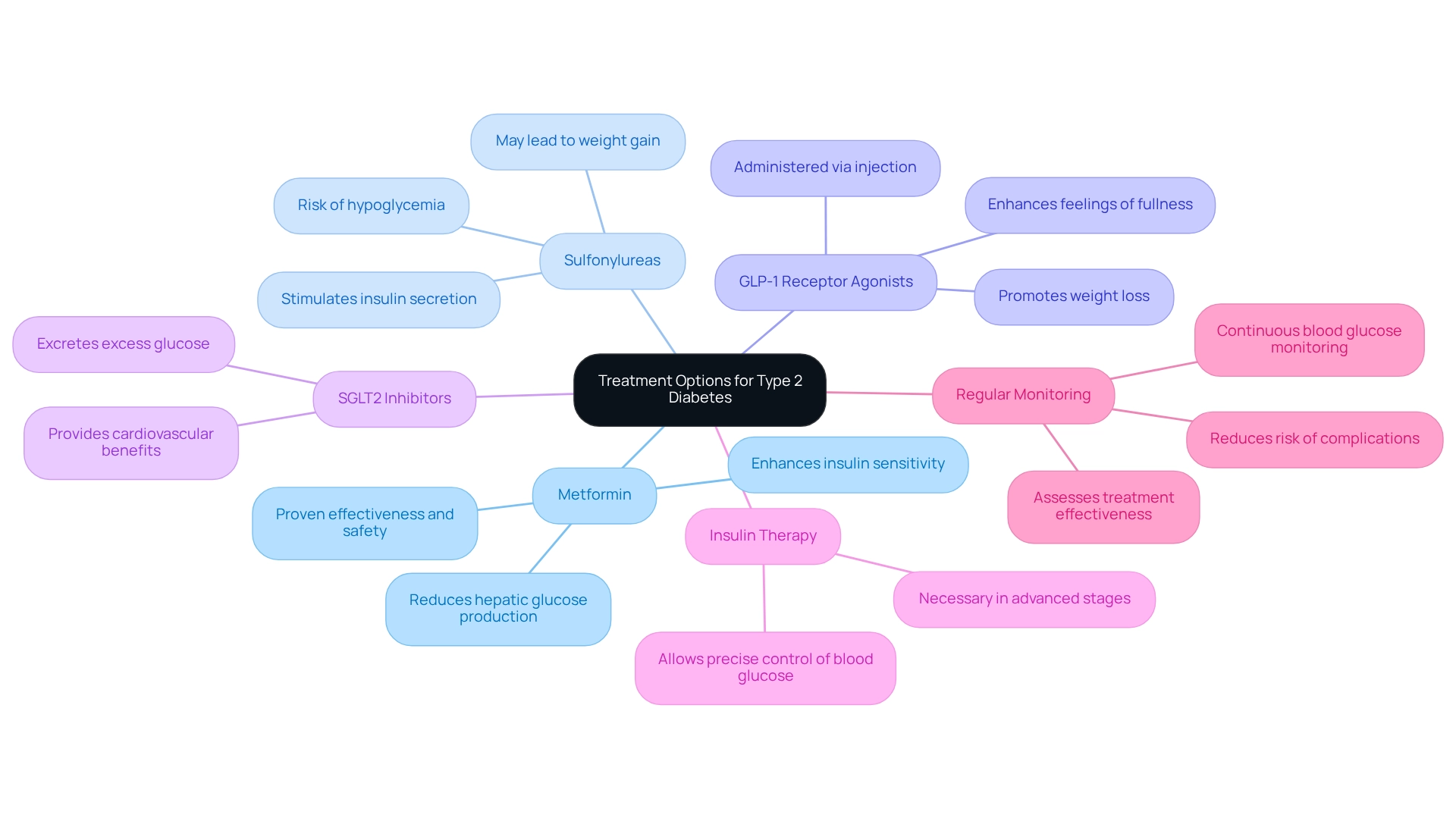
Mental Health and Diabetes: Coping Strategies for Patients
The onset of type 2 diabetes can bring about significant emotional challenges, making it vital to adopt effective coping strategies for your mental well-being. Here are several approaches that may help you navigate this journey:
- Seek Support: Connecting with friends, family, or support groups can be a crucial outlet for sharing your experiences and feelings. Peer support has shown to cultivate resilience and hope, enhancing overall management of the condition. T2DSolutions is a new platform focused on education and community support for those affected, dedicated to creating a nurturing environment that promotes sharing and connection with others facing similar challenges.
- Practice Stress Management: Techniques such as mindfulness, meditation, and deep breathing exercises can significantly alleviate stress and anxiety. These practices not only foster relaxation but also enhance your emotional health.
- Stay Informed: Gaining knowledge about diabetes-related issues can empower you, reducing feelings of uncertainty and anxiety. Understanding how dietary choices impact your mental health is essential, especially as recent medical research highlights stronger links between sugar consumption and symptoms of depression and anxiety.
- Set Realistic Goals: Focus on achievable objectives for managing your blood sugar, celebrating small victories along the way. This approach can boost your motivation and provide a sense of accomplishment, which is vital for your mental health.
- Communicate with Healthcare Providers: Open discussions about your emotional challenges with your healthcare team can lead to the support and resources you need. They can offer customized strategies to address mental wellness issues associated with diabetes.
- Consider Professional Assistance: If feelings of anxiety or depression persist, seeking help from a mental wellness expert can be beneficial. Recent research suggests that incorporating mental wellness strategies into glucose management can lead to improved outcomes. In fact, 87% of participants in digital mental wellness interventions reported satisfaction, underscoring the effectiveness of such support systems in managing emotional challenges.
Prioritizing your mental well-being is essential for effective diabetes management and overall health. By leveraging community resources and coping strategies, you can navigate the complexities associated with the onset of type 2 diabetes with greater confidence and resilience. T2DSolutions will soon offer a wealth of resources and support to assist you on your journey toward better health.
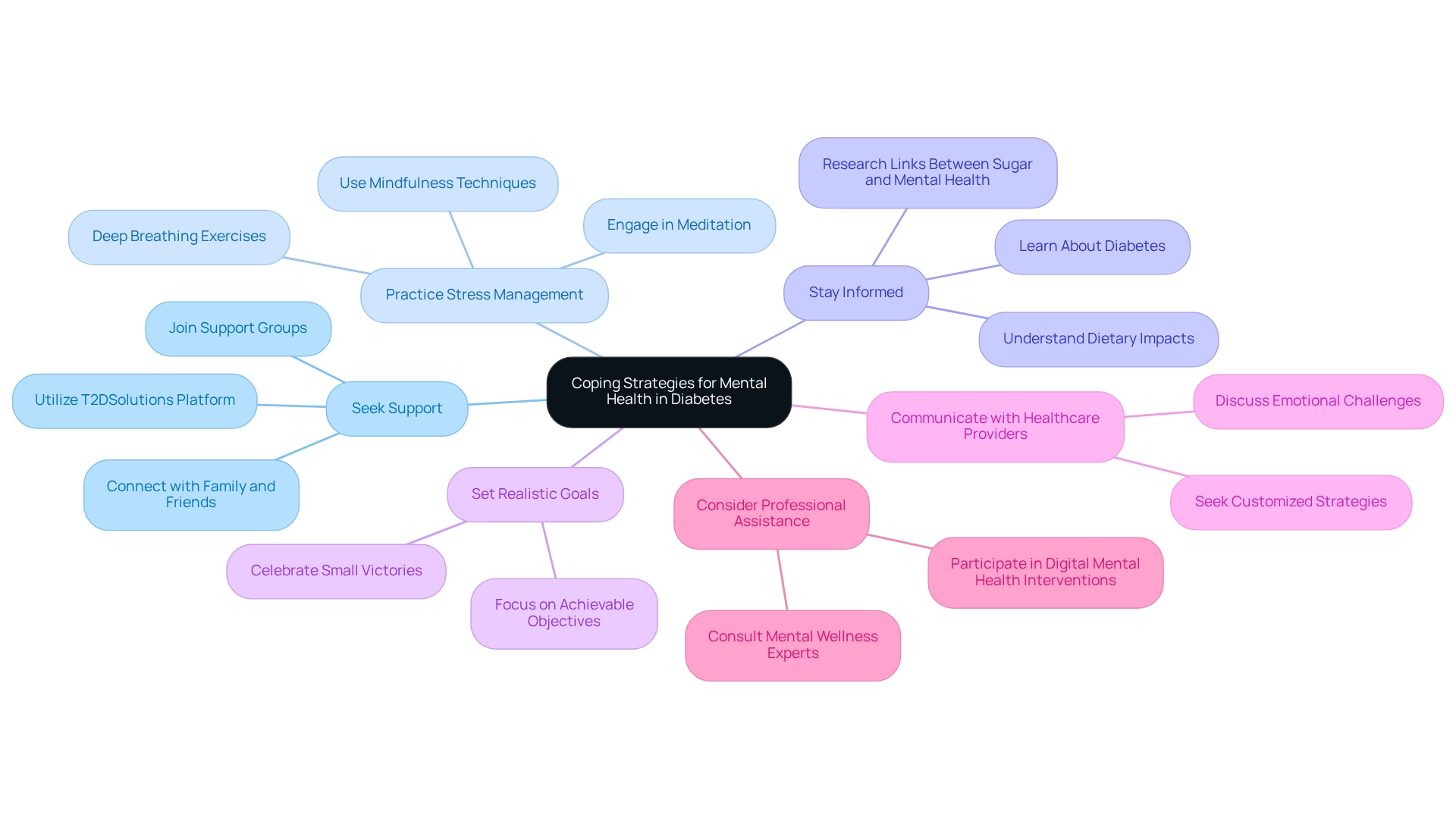
Building a Supportive Community for Diabetes Management
Creating a supportive community is vital for effectively managing your condition, and T2D Solutions is here to be your comprehensive resource on this journey. As a new site, T2D Solutions is dedicated to launching various initiatives that foster community support. Here are several strategies to enhance your engagement:
-
Join Support Groups: Participating in local or online support groups allows you to connect with others who share similar challenges. It's understandable to feel isolated, but recent data suggests that involvement in these groups can greatly improve emotional health and provide useful guidance. T2D Solutions will facilitate connections via its platform, ensuring you find the appropriate support.
-
Share Experiences: Promoting open conversations about managing your condition, including the challenges and successes, nurtures a sense of belonging. This sharing can be particularly beneficial. A focus group of 16 individuals aged 18 to 65 found that sharing personal experiences helped alleviate emotional distress. As Sarah Sauchelli pointed out, the increased anonymity of interacting through a digital platform aids in the exchange of personal experiences and emotional challenges, a characteristic T2D Solutions seeks to enhance.
-
Participate in Community Events: T2D Solutions will organize and promote awareness events, workshops, and health fairs, offering opportunities to connect with others and gain insights from specialists. These gatherings not only encourage learning but also strengthen community bonds. Exploring forums and social media groups focused on support can provide additional resources and connections. The transition to digital platforms during the COVID-19 pandemic has shown that online support groups can effectively sustain engagement and offer essential assistance for self-management of blood sugar control. T2D Solutions will provide a platform for these interactions, ensuring continuous support.
-
Collaborate with Healthcare Providers: Partnering with healthcare teams to develop community-based programs improves education and support related to blood sugar management. Initiatives like the digital transition of peer support groups during the pandemic have demonstrated the effectiveness of collaborative approaches in improving health outcomes. T2D Solutions is dedicated to working alongside healthcare providers to enhance your management experience. Establishing a strong support network not only boosts resilience but also offers valuable resources for handling health conditions effectively. By fostering community connections through T2D Solutions, you can navigate your diabetes journey with greater confidence and support.
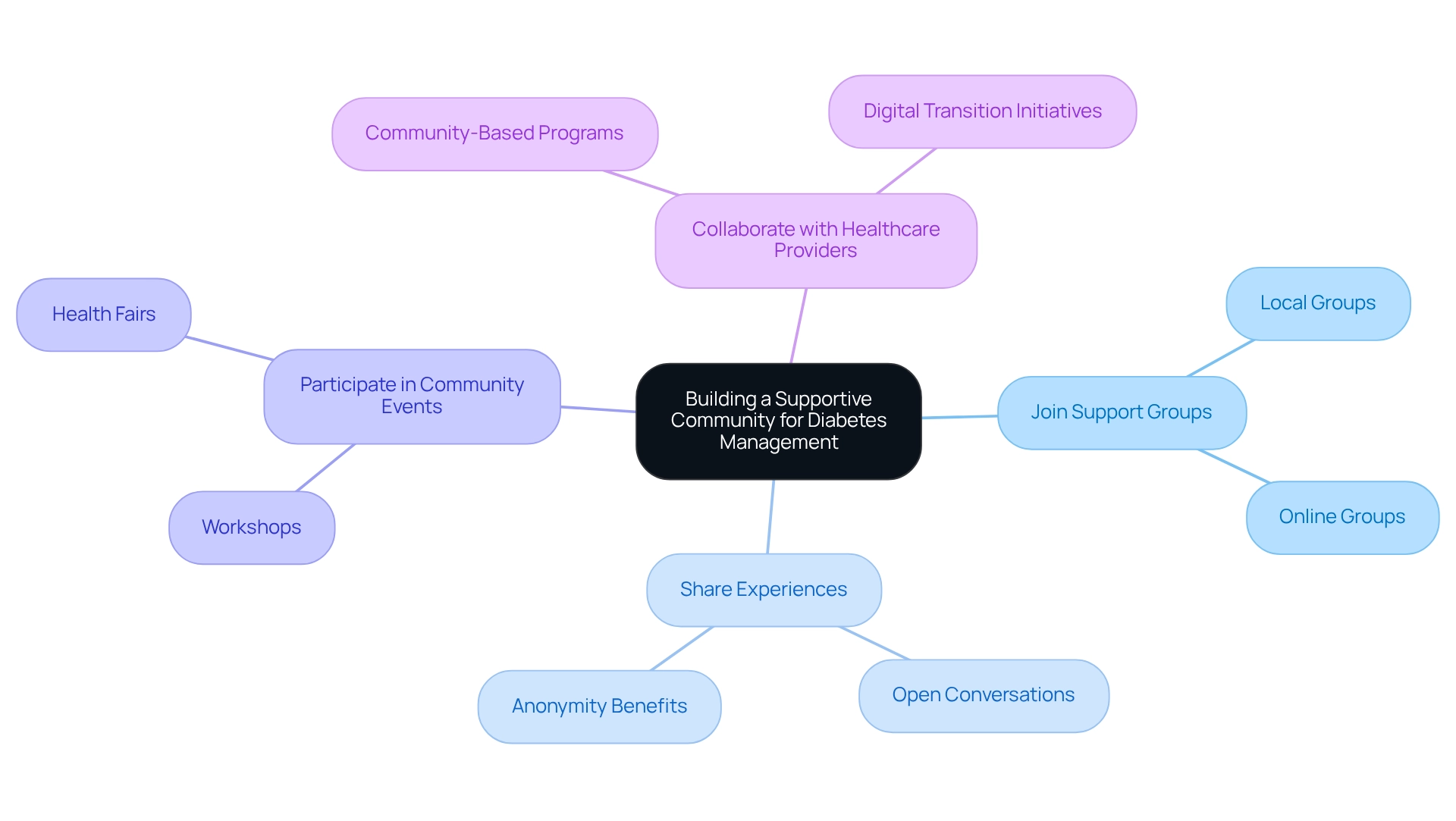
Conclusion
Type 2 Diabetes is a complex condition that significantly impacts millions of lives, yet it is one that can be managed effectively through education, lifestyle changes, and community support. Throughout this article, we have explored the multifaceted nature of Type 2 Diabetes. We have delved into understanding its underlying mechanisms, recognizing early symptoms, identifying risk factors, and discussing treatment options. Importantly, we have highlighted the significance of mental health in managing diabetes, underscoring the need for a holistic approach to care.
Empowering individuals with knowledge about their condition is crucial in fostering proactive management strategies. By making informed dietary choices, engaging in regular physical activity, and utilizing available resources like T2DSolutions, those affected can take significant steps toward better health outcomes. It's understandable to feel overwhelmed, but recognizing the psychological aspects of living with diabetes and building a supportive community are essential components of effective disease management.
As the diabetes landscape continues to evolve, staying informed about the latest research and treatment options will enable you to navigate your journey with confidence. Remember, the path to managing Type 2 Diabetes is not solely about medical interventions; it encompasses a comprehensive approach that integrates lifestyle modifications, mental health care, and strong community ties. By embracing this multifaceted strategy, you can enhance your well-being and significantly improve your quality of life. You're not alone in this journey; we are here to support you every step of the way.
Frequently Asked Questions
What is type 2 diabetes mellitus?
Type 2 diabetes mellitus is a chronic condition that affects how the body metabolizes sugar (glucose), leading to elevated blood sugar levels due to insulin resistance or insufficient insulin production.
Who is primarily affected by type 2 diabetes?
Type 2 diabetes is primarily observed in adults, but there is an increasing incidence among children and adolescents, largely attributed to rising obesity rates.
What are the common symptoms of type 2 diabetes?
Common symptoms include increased thirst and frequent urination, extreme hunger, fatigue, blurred vision, slow-healing sores or frequent infections, and areas of darkened skin.
Why is early identification of type 2 diabetes symptoms important?
Early identification of symptoms is crucial for effective management and prevention of complications, as type 2 diabetes was the eighth leading cause of death in the U.S. in 2021.
What factors can elevate the risk of developing type 2 diabetes?
Risk factors include being overweight or obese, inactivity, family history, age (particularly over 45), certain ethnic backgrounds, high blood pressure, abnormal cholesterol levels, and gestational insulin resistance.
How can lifestyle changes impact the management of type 2 diabetes?
Simple changes in diet and lifestyle can lead to significant improvements in blood sugar control and overall health, potentially addressing the onset of type 2 diabetes within weeks.
What resources are available for managing type 2 diabetes?
Resources such as T2DSolutions offer education, community support, and practical advice for individuals managing type 2 diabetes and its symptoms.
What role does current research play in understanding type 2 diabetes?
Current research focuses on insulin resistance and its complexities, which is essential for developing targeted therapies and improving patient outcomes in type 2 diabetes management.
